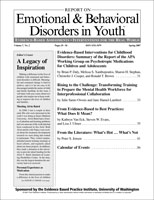Implementing School Mental Health and Positive Behavioral Interventions and Supports
Author: Joni W. Splett.; Kurt D. Michael.; Christina Minard and Heather Reynolds.; Robert Stevens.; Louise Johnson; Katie Farber and Mark D. Weist.
Source: Volume 14, Number 04, Fall 2014 , pp.87-95(9)

< previous article |next article > |return to table of contents
Abstract:
In recent years, Positive Behavioral Interventions and Supports (PBIS) and School Mental Health (SMH) have benefited from national and regional investment and implementation support resulting in increased dissemination and adoption. However, efforts to blend the two initiatives into the Interconnected Systems Framework (ISF) to realize hypothesized outcomes, including increased access to the full continuum of effective prevention, intervention, treatment, and post-intervention services, have been limited to several pilot schools, districts, and state coordinating teams. In North and South Carolina, researchers, policymakers, and practitioners have collaborated to advance the ISF regionally. The study described here sought to support that work by mapping where PBIS and/or SMH are being implemented across the Carolinas in order to better identify opportunities for interconnection and expansion. The article reviews the history of both initiatives in North and South Carolina and discusses the findings, limitations, and implications of the study. Study findings suggest that less than 5% of schools in North and South Carolina, separately, are implementing both PBIS and SMH. However, in states where there is strong coordination of the initiatives in a relevant state agency, implementation is more widespread. In addition, PBIS and SMH are found to be most commonly implemented in elementary schools, and schools implementing both seem to be in larger school districts. These results provide concrete opportunities to expand implementation of the ISF in North and South Carolina and represent strategies for advancing similar work nationally. Joni Splett, Ph.D., is a licensed psychologist and postdoctoral fellow with the University of South Carolina’s Department of Psychology and the School Mental Health Team. Kurt Michael, Ph.D., is a professor in the Department of Psychology at Appalachian State University. Christina Minard, M.S., is Allied Health Consultant at the North Carolina Department of Public Instruction. Robert Stevens, CSP, Ph.D., is former director of the Charleston County School District’s Office of Prevention and Intervention. Louise Johnson, M.S., is director, Division of Children, Adolescents, and Families at the South Carolina Department of Mental Health. Heather Reynolds, M.S., is a former PBIS consultant at the North Carolina Department of Public Instruction. Katharina Faerber, B.A., is a former research assistant with USC’s Department of Psychology School Mental Health Team. Mark Weist, Ph.D., is professor and director of the Clinical-Community Program in USC’s Department of Psychology and director of the Department of Psychology School Mental Health Team.Keywords: Interconnected Systems Framework (ISF), Positive Behavioral Interventions and Supports (PBIS)
Affiliations:
1: University of South Carolina; 2: Appalachian State University; 3: North Carolina Dept of Public Instruction; 4: Charleston County School District (ret.); 5: SC Dept of Mental Health; Univ of S Carolina.